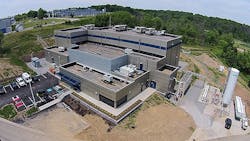Alcoa opened a new plant at its research center near Pittsburgh where it will manufacture metal powders in proprietary grades of titanium, nickel, and aluminum, to be used for its 3D-printing operations in California, Georgia, Michigan, Pennsylvania, and Texas. The project was part of a $60-million program announced last fall to expand and develop capabilities for 3D-printing aerospace parts.
The capacity of the new plant was not announced, though Alcoa noted that the existing production capacity for metal powders needed for 3D printing is limited, and that the new plant would develop and supply materials with the specific properties needed for its 3D-printing projects.
“Alcoa is forging a leadership path in additive manufacturing with a sharp focus on the critical input material—metal powders,” stated chairman and CEO Klaus Kleinfeld. “We are combining our expertise in metallurgy, manufacturing, design, and product qualification to push beyond the possibilities of today’s 3D-printing technologies for aerospace and other growth markets.”
The aerospace market is one of the principle markets for Alcoa, though most of its operations producing aerospace materials and components will be included in the planned spinoff of its downstream operations. That separation, which will establish a company to be called Arconic, is scheduled to take place later this year.
Recently, Alcoa was assigned a long-term supply contract by Airbus to supply various parts, including 3D-printed titanium fuselage and engine pylon parts for commercial aircraft.
The emphasis on additive manufacturing has accelerated in the past two years for Alcoa, following its effort to build programs supplying high-value forgings, castings, and mill products for aerospace engines and structures. It also complements the 2015 acquisition of RTI International, which included several additive manufacturing capabilities that complemented Alcoa’s existing resources.
In addition to this, Alcoa last year introduced a proprietary process called Ampliforge™, which follows 3D-printing with a die-forging step, to improve mechanical and structural qualities of the part. The Ampliforge process is being piloted at Alcoa plants in Pittsburgh and Cleveland.
Alcoa also uses hot-isostatic pressing to treat 3D-printed parts. HIP strengthens the structural qualities of titanium and nickel-based super-alloys.
About the Author
Robert Brooks
Editor/Content Director - Endeavor Business Media
Robert Brooks has been a business-to-business reporter, writer, editor, and columnist for more than 20 years, specializing in the primary metal and basic manufacturing industries. His work has covered a wide range of topics including process technology, resource development, material selection, product design, workforce development, and industrial market strategies, among others.
Currently, he specializes in subjects related to metal component and product design, development, and manufacturing—including castings, forgings, machined parts, and fabrications.
Brooks is a graduate of Kenyon College (B.A. English, Political Science) and Emory University (M.A. English.)

